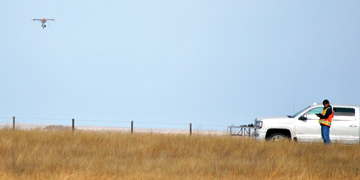Current Temperature
The Drone Effect: Going beyond visual line of sight
Posted on May 21, 2019 by 40 Mile Commentator Commentator/Courier File PhotoAn Aeryon SkyRanger drone comes in for a landing, with Owen Brown, co-owner of Ventus Geosptial closely recording the data, when the Foremost UAS Range launched the first Beyond Visual Line of Sight test flight of a UAS in Canada on Friday afternoon. The flight was also the first of its kind to be approved by Transport Canada.
Commentator/Courier File PhotoAn Aeryon SkyRanger drone comes in for a landing, with Owen Brown, co-owner of Ventus Geosptial closely recording the data, when the Foremost UAS Range launched the first Beyond Visual Line of Sight test flight of a UAS in Canada on Friday afternoon. The flight was also the first of its kind to be approved by Transport Canada.
Stan Ashbee
Alberta Newspaper Group
Foremost’s UAS Test Range (FUTR) is a Transport Canada approved test range for drone operators. The range has a Beyond Visual Line Of Sight (BVLOS) allowance.
About advancing the unmanned systems sector of the economy,â€ù said Doug Hanna, general manager of the range. “Primarily to move from visual line of sight to beyond visual line of sight.â€ù
There are two kinds of users, according to Hanna — original equipment manufacturers/drone manufacturers/sub-system manufacturers and companies. “It might be the control system or it might be some imaging payload it might carry. Any of those kinds of original equipment manufacturers might have a reason to come and do either research or just testing at Foremost.
The bigger user is really the companies that use drones, as part of their business. Those companies are trying to do something with them — whether they’re trying to image a roadway or survey an area or inspect pipeline,â€ù he said, adding companies might also want to image different agricultural fields and/or crops.
For any of those applications there’s only a certain amount companies can do visual line-of-sight-wise, Hanna noted. Visual line of sight means they’re flying within 500-700 metres from where the pilot is located.
Hanna said the pilot and an observer keep the drone in sight at all times to make sure there are no collisions with other flying objects possibly in the air.
There are many applications that are not well-addressed by that approach of flying a drone only 500 metres from its operator, he said, adding the pipeline and forestry industries are examples. That instantly becomes beyond visually out of sight,â€ù he said. In some cases, the visual line of sight could be less than 500 metres.
According to Hanna, the Foremost range allows operators wanting to operate beyond visual line of sight to show their systems work and they can operate competently and are able to do collision avoidance beyond visual line of sight.
We’re just working on that now. We’re still new at this, so we’re developing an accreditation. It’s a certification of sorts. And, we’re developing a flight test plan companies can use to address the technical issues and the operational issues associated with what that certification is,â€ù he noted.
Small companies trying to grow their businesses want to be able to do this, he said. They want to be able to address these other applications that require beyond visual line of sight. That’s what we’re lined up to help them do,â€ù Hanna said.
For more information about the range visit foremostuasrange.ca. Operating season is from Aug. 1 to May 31.
This range is one of only two in all of Canada. The other is in Quebec Hanna said.
We’re fortunate in Alberta to have this in our backyard. Alberta has more companies operating and utilizing drones than any other province in Canada, regardless of their respective populations,â€ù he said.
BVLOS certification is the next step in the process and very rare, Hanna said. There was only four issued last year in all of Canada and that was under a pilot project program Transport Canada launched.
Leave a Reply
You must be logged in to post a comment.

